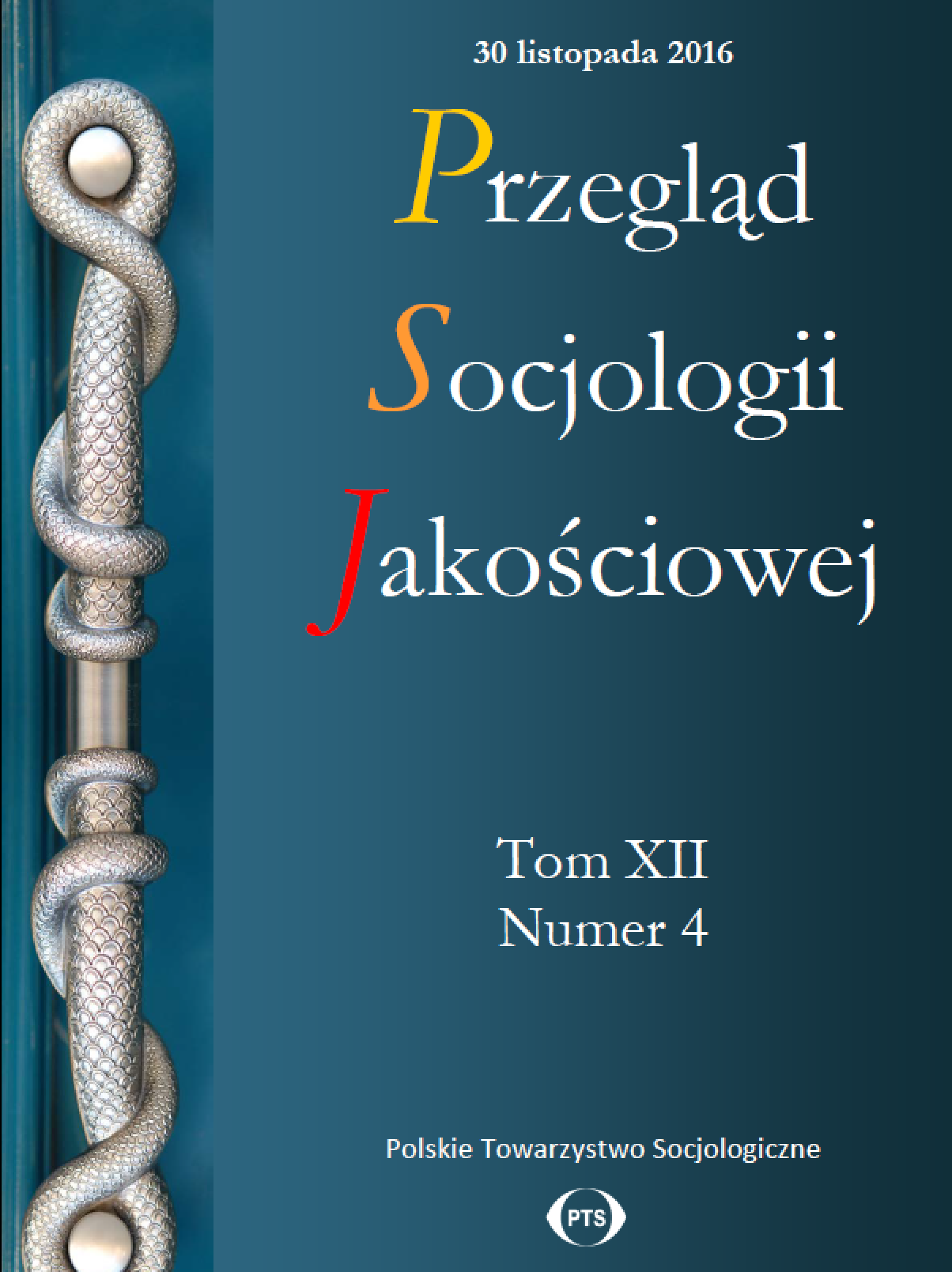Jak zgadzają i nie zgadzają się dzieci. O (nie)równowadze sił i świadomej zgodzie w badaniach z dziećmi
DOI:
https://doi.org/10.18778/1733-8069.12.4.03Słowa kluczowe:
świadoma zgoda, dzieci, etyka badańAbstrakt
Artykuł przedstawia kwestię świadomej zgody w badaniach z dziećmi w perspektywie etyki i metodologii badań. Bazując na własnych badaniach z udziałem dzieci, autorki przedstawiają rozważania na temat wagi takiej zgody, a następnie sposoby, w jakie dzieci mogą wyrazić zgodę lub jej nie udzielić. Udzielenie zgody na badanie przez dzieci zostało przedstawione jako proces, nie jednorazowy akt. Jednocześnie jednak autorki zwracają uwagę na to, że sam moment udzielenia zgody pełni ważną funkcję, wzmacniając pozycję dziecka w badaniu.
Pobrania
Bibliografia
Alderson Patricia, Morrow Virginia (2011) The Ethics of Research with Children and Young People: A Practical Handbook. London, Thousand Oaks, New Delhi: SAGE.
Google Scholar
DOI: https://doi.org/10.4135/9781446268377
Christensen Pia, Prout Alan (2002) Working with Ethical Symmetry in Social Research with Children. „Childhood”, vol. 9, s. 477–497.
Google Scholar
DOI: https://doi.org/10.1177/0907568202009004007
Dockett Sue, Perry Bob (2011) Researching with Young Children: Seeking Assent. „Child. Ind. Res.”, vol. 4, s. 231–247.
Google Scholar
DOI: https://doi.org/10.1007/s12187-010-9084-0
Dockett Sue, Einarsdóttir Johanna, Perry Bob (2012) Young Children’s Decisions about Research Participation: Opting Out. „International Journal of Early Years Education”, vol. 20, no. 3, s. 244–256.
Google Scholar
DOI: https://doi.org/10.1080/09669760.2012.715405
Fluehr-Lobban Carolyn (1994) Informed Consent in Anthropological Research: We Are Not Exempt. „Human Organisation”, vol. 53, no. 1, s. 1–10.
Google Scholar
DOI: https://doi.org/10.17730/humo.53.1.178jngk9n57vq685
Fluehr-Lobban Carolyn (2000) How Anthropology Should Respond to an Ethical Crisis. „Chronicle of Higher Education”, vol. 47 [dostęp 14 stycznia 2016 r.]. Dostępny w Internecie http://anthroniche.com/darkness_documents/0039.htm
Google Scholar
Gallacher Leslie-Ann, Gallagher Michael (2008) Methodological Immaturity of Research with Children? Thinking Through “Participatory Methods”. „Childhood”, vol. 15, no. 4, s. 499–516.
Google Scholar
DOI: https://doi.org/10.1177/0907568208091672
Gallagher Michael (2008) „Power Is Not an Evil”. Rethinking Power in Participatory Methods. „Children’s Geographies”, vol. 6, no. 2, s. 137–150.
Google Scholar
DOI: https://doi.org/10.1080/14733280801963045
Giesbertz Noor, Bredenoord Annelien, van Delden Johannes JM (2014) Clarifying Assent in Pediatric Research. „European Journal of Human Genetics”, vol. 22, s. 266–269.
Google Scholar
DOI: https://doi.org/10.1038/ejhg.2013.119
Graham Anne, Fitzgerald Robyn Margaret (2010) Progressing Children’s Participation: Exploring the Potential of a Dialogical Turn. „Childhood”, vol. 17, no. 3, s. 343–359.
Google Scholar
DOI: https://doi.org/10.1177/0907568210369219
Greene Sheila, Hill Malcolm (2005) Researching Children’s Experience: Methods and Methodological Issues [w:] Sheila Greene, Diane Hogan, eds., Researching Children’s Experiences. London, Thousand Oaks, New Delhi, Singapore: Sage, s. 1–21.
Google Scholar
Hill Malcolm (2005) Ethical Considerations in Researching Children’s Experiences [w:] Sheila Greene, Diane Hogan, eds., Researching Children’s Experiences. London, Thousand Oaks, New Delhi, Singapore: Sage, s. 61–86.
Google Scholar
Hoonaard Will van den (2001) Is Ethics Review a Moral Panic? „The Canadian Review of Sociology and Anthropology”, vol. 38, no. 1, s. 19–35.
Google Scholar
DOI: https://doi.org/10.1111/j.1755-618X.2001.tb00601.x
Israel Marc, Hay Ian (2006) Research Ethics for Social Scientists. London, Thousand Oaks, New Delhi: Sage.
Google Scholar
DOI: https://doi.org/10.4135/9781849209779
James Allison (2007) Giving Voice to Children’s Voices: Practices and Problems, Pitfalls and Potentials. „American Anthropologist”, vol. 109, no. 2, s. 261–272.
Google Scholar
DOI: https://doi.org/10.1525/aa.2007.109.2.261
James Allison, Adrian James (2008) Key Concepts in Childhood Studies. London, Thousand Oaks, New Delhi, Singapore: Sage.
Google Scholar
Konwencja o prawach dziecka (1991) [dostęp 15 stycznia 2016 r.]. Dostępny w Internecie http://brpd.gov.pl/konwencja-o-prawach-dziecka
Google Scholar
Lisek-Michalska Jolanta (2012) Etyczne aspekty badań fokusowych z udziałem dzieci i młodzieży. „Acta Universitatis Lodziensis. Folia Sociologica”, nr 42, s. 33–61.
Google Scholar
Maciejewska-Mroczek Ewa (2015) Po co antropologom zabawa? O zabawowych aspektach badań antropologiczno-kulturowych, „Lud”, t. 99, s. 253–270.
Google Scholar
Punch Samantha (2002) Research with Children. The Same or Different from Research with Adults? „Childhood”, vol. 9, s. 321–341.
Google Scholar
DOI: https://doi.org/10.1177/0907568202009003005
Reinharz Shulamit (1992) Feminist Methods in Social Research. New York, Oxford: Oxford University Press.
Google Scholar
Ruiz-Cesares Mónica, Jennifer Thompson (2016) Obtaining Meaningful Informed Consent: Preliminary Results of a Study to Develop Visual Informed Consent Forms with Children. „Children’s Geographies”, vol. 14, no. 1, s. 35–45.
Google Scholar
DOI: https://doi.org/10.1080/14733285.2014.971713
Tillman Klaus-Jurgen (2013) Teorie socjalizacji. Społeczność, instytucja, upodmiotowienie. Przełożyli Grzegorz Bluszcz, Bartek Miracki. Warszawa: Wydawnictwo Naukowe PWN.
Google Scholar
Vaele Angela (2005) Creative Methodologies in Participatory Research with Children [w:] Sheila Greene, Diane Hogan, eds., Researching Children’s Experience. Los Angeles, London, New Delhi: SAGE, s. 253–272.
Google Scholar
Waligóra Marcin (2011) Prawo dziecka do odmowy udziału w eksperymencie medycznym [w:] Jan Hartman, Marcin Waligóra, red., Etyczne aspekty decyzji medycznych. Warszawa: Wolters Kluwer, s. 89–95.
Google Scholar
Waligóra Marcin, Dranseika Vilius, Piasecki Jan (2014) Child’s Assent in Research: Age Threshold or Personalization? „BMC Medical Ethics”, vol. 15, DOI: 10.1186/1472-6939-15-44.
Google Scholar
DOI: https://doi.org/10.1186/1472-6939-15-44
Walkerdine Valerie (2008) Psychologia rozwojowa i badania dzieciństwa [w:] Mary Jane Kehily, red., Wprowadzenie do badań nad dzieciństwem, przełożył Marek Kościelniak. Kraków: WAM, s. 135–150.
Google Scholar
Warming Hanne (2011) Getting Under Their Skins? Accessing Young Children’s Perspectives Through Ethnographic Fieldwork. „Childhood”, vol. 18, s. 39–53.
Google Scholar
DOI: https://doi.org/10.1177/0907568210364666
Watkins Joe (2002) Roles, Responsibilities, and Relationships between Anthropologists and Indigenous People in the Anthropological Enterprise [w:] „El Dorado Task Force Papers”, vol. 2. Arlington, VA: American Anthropological Association, s. 64–79 [dostęp 15 stycznia 2016 r.]. Dostępny w Internecie http://www.aaanet.org/edtf/final/vol_two.pdf
Google Scholar
Woodhead Martin, Faulkner Dorothy (2008) Subjects, Objects or Participants? Dilemmas of Psychological Research with Children [w:] Pia Christensen, Allison James, eds., Research with Children: Perspectives and Practices. Abington, New York: Routledge, s. 10–39.
Google Scholar
Pobrania
Opublikowane
Jak cytować
Numer
Dział
Licencja

Utwór dostępny jest na licencji Creative Commons Uznanie autorstwa – Użycie niekomercyjne – Bez utworów zależnych 4.0 Międzynarodowe.














